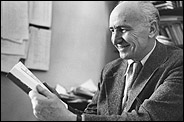Louis Dudek: A poet's poet
 Emeritus Professor Louis Dudek
Emeritus Professor Louis DudekPHOTO: McGill University Archives |
|
Louis Dudek, professor emeritus in the Department of English, passed away on Thursday, March 22, 2001, at the age of 83.
His contribution to Canadian literature as essayist, polemicist, critic and commentator gave the Faculty of Arts one of its most eminent scholars, but it is as a poet, and a defender of poetry's value in our lives, that he will be most keenly missed by a wider community of Canadian writers and readers.
Professor Dudek joined the Department of English in 1951, after doctoral studies at Columbia University. Born in Montreal in 1918, he completed his BA at McGill in 1939, worked briefly in advertising, and was prominent among the poets who participated in First Statement (1942-1945), a seminal "little magazine" in the development of modern Canadian literature.
Returning from seven years in New York, he established himself promptly on the literary scene with his long poems Europe (1954) and En Mexico (1958) and maintained his commitment to the long poem throughout his life: Atlantis, a breakthrough experiment in modern form, appeared in 1967; Continuations --an ongoing record of the poet in his meditative life -- appeared in four volumes between 1981 and 2000.
In and among these high-water marks Dudek published another 16 volumes of poetry. His life-long commitment to self-publication, as a means of ensuring the poet's freedom from contamination by the marketplace, and his advocacy of modernism were exemplary for generations of younger poets.
Dudek also earned distinction among the founders of Canadian literary criticism. His pithy, demanding essays were collected in various volumes, most notably in Selected Essays and Criticism (1978) and in a special issue of Open Letter (1981).
He was a regular contributor of articles to Canadian academic journals and, in keeping with his commitment to literature as part of daily life, made frequent appearances on CBC Radio and in various newspapers as a commentator on the arts and culture.
Dudek did not see such commitments as detracting from his vocation as a poet. He always sought forms and modes of poetry that would allow the expression of philosophical insight as readily as the articulation of feeling, and later in his career he found striking new forms for their convergence, most notably in Ideas For Poetry (1983).
A gifted and natural lecturer, Dudek gave one of the most popular and challenging courses in the history of the Faculty of Arts. "Great Writings of Europe," a linked two-year course, brought together the finest literature of the last three centuries in an attempt to understand the dynamic of tradition and subversion that had reached a disastrous climax in the twentieth century.
The course swelled rapidly from an early enrolment of thirty to five hundred but (to my personal regret as his later student) was abandoned in the campus disruptions and curricular re-directions of the 1960s.
Dudek's poetry received little critical discussion during his lifetime, a lack I believe he felt keenly, even though he shunned the kinds of fame and reputation that successful poets sometimes receive from their purchasers. His death will surely bring about a deepening of attention to his poetry's beauty and accomplishment as much as to its capaciousness of idea.
Real recognition, Dudek would probably remark, is almost always retrospective.
Professor Brian Trehearne
Department of English

